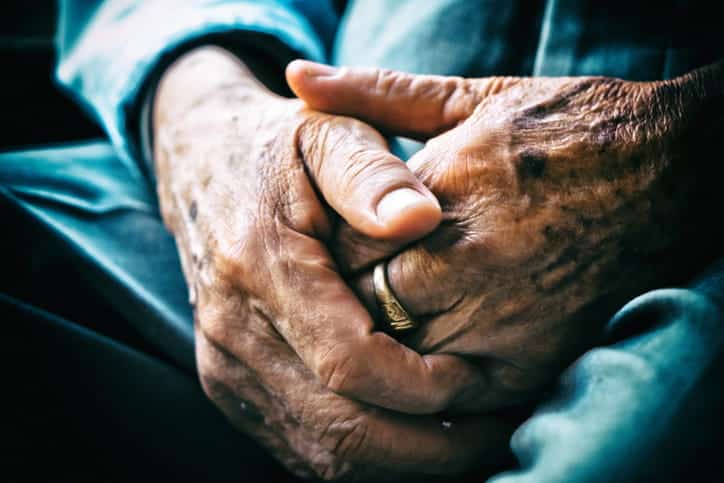Elderly skin care should be at the top of all individuals’ minds, especially those in their senior years. As we age, our skin changes, and it’s important to know what that change looks like and how to respond to it with an appropriate skincare routine. Whether you live independently or at an assisted living facility, it’s important to keep up with your skin health.

Contact Haven Health to see how our medical team can help your loved one get the care they deserve. Schedule an appointment to learn more about the best assisted living facility near you.
What Is the Best Skin Care Routine for Senior Citizens?
If you are 70 years old or older, you may wonder if there is such a thing as a senior citizen skincare routine and be curious about what it looks like.
Today, we’ll discuss the importance of elderly skin care, what a routine should look like, elderly skin care tips and tricks, and how to spot and address skin concerns so your skin stays as healthy as possible — even as you enter your golden years.
Whether you live at home or in an assisted living facility, it’s important to incorporate these elderly skin care tips into your daily routine.
1. Use a Gentle Fragrance-Free Cleanser
Clean skin is healthy, and you should always use a gentle, fragrance-free cleanser when you wash your face and body. A gentle, fragrance-free cleanser that does not have harsh chemicals can help keep your skin clean, soft, and moisturized.
2. Use Warm Water
Always use warm water when you clean your face and body. Hot water strips your skin of its natural oils and can leave you feeling itchy and dry.
3. Keep Showers and Baths Short
As we age, our skin appears dry and loose because of the loss of collagen and elasticity. Staying in a bath or shower for too long can contribute to additional damage because your skin is stripped of natural oils that keep it regulated. Keep your baths short and showers shorter to maintain the overall moisture in your skin.
4. Apply Fragrance-Free Moisturizer
Moisturizer helps bring and lock moisture into your skin to feel supple and stay hydrated. As we age, our body cannot produce a sufficient amount of hyaluronic acid, which results in dry, flaky, cracked skin. A fragrance-free moisturizer is one way to introduce that hydration and lock it in so your skin has a more youthful appearance and is free from dryness that can lead to other issues.
How Do You Take Care of 70 to 80-Year-Old Skin?
Caring for 70- to 80-year-old skin is very different from caring for a young adult’s skin. Elderly skin is more prone to dryness and damage because it has lost collagen and natural oils that give it a youthful appearance.
Skin also gets thinner as we age and feels looser and more sensitive. The following are important steps to incorporate into your elderly skincare routine to help keep it hydrated and healthy.
Moisturize Often
As we age, our skin begins to show signs of dryness, which leads to itching and scratching. This cycle can cause skin to become cracked and inflamed and lead to other issues with the overall health of your skin.
Use a fragrance-free, chemical-free moisturizer anytime you get out of the shower, wash your hands or face, or simply want your skin to feel more supple. You should also take care to apply a moisturizer to sensitive areas of your body, like your neck and face.
Protect Your Skin From the Sun
The sun can be especially harmful to elderly individuals who already have sensitive skin. Use broad-spectrum SPF sunscreen whenever you go out, even on cloudy days. Sunscreen is a barrier against the sun’s UV rays and minimizes skin damage and your overall risk of developing skin cancer.
Related: Dental Care Tips for Elderly Individuals
Fragrance-Free and Unscented: Know the Difference
Many products advertise themselves as “unscented.” However, this is a general term that typically means a product has chemical components used to cover up the scent of other ingredients.
On the other hand, the term fragrance-free describes products that do not have artificial ingredients used to cover up the scent of other ingredients. Fragrance-free products are better for your skin than unscented products.
Check Your Skin for Signs of Skin Cancer

Skin cancer remains to be one of the most common types of cancer Americans face on an annual basis. According to the Skin Cancer Foundation, one in five Americans will develop skin cancer by the age of 70. If skin cancer is detected early, the 5-year survival rate for melanoma is 99%. Additionally, individuals with five or more sunburns face double the risk for melanoma.
- Regularly check your skin for signs of skin cancer
- Look for moles and black or dark brown spots on your body
- If you have spots that are of concern, pay attention to any changes in their size, shape, or color
- Look for moles that are painful to the touch
- Sores or spots that have not healed within two weeks and sores or spots that ooze, bleed, or develop a scaly or crusty surface
- Senior individuals, especially those in an assisted living facility or senior care facility who are at high risk for melanoma, should regularly undergo skin exams to catch and address any concerns early on
Know your skin. Ask the medical team at your assisted living facility to check your skin on a regular basis to ensure your skin health is where it needs to be.
Find a senior care facility near you when you speak with the team at Haven Health. Contact us today to learn more.
Sources:
Melanoma. (2024).
Papakonstantinou, E., et al. (2012). Hyaluronic acid: A key molecule in skin aging.
Skin Cancer Facts & Statistics. (2024).